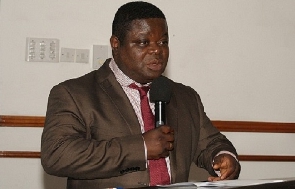Despite the waning investor mood, Professor Peter Quartey, Director of the Institute of Statistical, Social and Economic Research (ISSER), says stabilising the domestic economy and fostering confidence remains crucial for a turnaround of the economy. Investors’ confidence has been at record lows following the deterioration of the country’s public finances, largely reflecting recent credit rating downgrades to junk status by all three rating agencies, Moody’s, S&P and Fitch. At the launch of the State of the Economy report 2021 and review of Q3 2022 economic performance, Professor Quartey said: “We need some confidence-building in the system. Stabilise the domestic market and build confidence in the economy." “In building confidence in the economy, fiscal consolidation remains key. A few things we can do is to mobilise taxes and non-tax revenue and look at the imports bill. Now, in the exemption law, 5.1 percent of our total expenditure is on import exemptions, which is very high. We need to work on that,” he said. “Non-tax revenues, state-owned enterprises, property rates, government fees and charges need to be streamlined and make sure government gets its revenue. We need to reintroduce tolling systems and also an e-pass to avoid congestion, to make it more efficient,” the economist suggested. On the fiscal front, the Bank of Ghana reports that the budget implementation – using banking sector data – for the first 9-months of 2022 recorded an elevated overall cash deficit of 6.4 percent of GDP, against the revised programmed target of 5 percent of GDP. Detailing, the BoG noted that total receipts were GH¢51.49billion (8.7 percent of GDP) over the review period, falling short of the projected target of GH¢60.08billion (10.2 percent of GDP) and representing 85.7 percent of the budgeted estimate. Total payments of GH¢89.04billion (15.0 percent of GDP) were almost on target, representing 99.5 percent of GH¢89.46billion (15.1 percent of GDP). The deficit of GH¢37.56billion, together with net foreign loan repayments of GH¢3.54billion, created a resource gap of GH¢41.1billion, which was financed from domestic sources and use of resources from the Stabilisation Fund. “So with the fiscal consolidation being experienced, we are likely to crowd out the private sector which is the engine of growth if you’re not careful, if you continue to borrow from the domestic system. “We need to reduce the size of government, which would send a clear signal to the market that we are serious about fiscal consolidation. It would send a signal to the market that it is a government which wants to address the challenges; otherwise, at the current rate, no matter what you say no one will take you seriously,” he said. He further stated that the potential for additional revenue measures may result in a further reduction of the deficit in 2023, but efforts to enact new taxes or boost tax rates may be thwarted by government’s tenuous parliamentary majority. In building investor confidence, Prof. Quartey mentioned that there is a need for government to clearly communicate with the market on its treatment of the country’s unsustainable debt, as this has become a major concern for investors. The economy’s downgrade has contributed to a prolonged lack of access to Eurobond markets, thereby leading to a significant decline in external liquidity. Access to external financing is expected to remain tight, as Ghana is likely to remain locked out of Eurobond markets – which had become a regular source of external financing for government – until 2025. The nation faces US$2.75billion of external debt servicing in 2022, including amortisation and interest; and US$2.8billion in 2023. Government’s high-interest costs and structurally low revenue as a percentage of GDP increases the likelihood that IMF support will necessitate some form of debt treatment. The high-interest burden on local-currency debt also means that a domestic debt treatment cannot be ruled out.
Business News of Thursday, 27 October 2022
Source: thebftonline.com
Stabilise domestic market, build confidence – Prof. Quartey advises
Entertainment
















